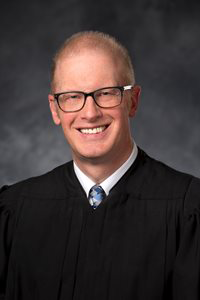District Court Judge

St. Louis County
View state court bio
Contact with Chambers
• Preferred method to contact chambers: Telephone
• To whom may attorneys direct scheduling/logistical questions? Jenna Palumbo, court reporter, at 218-221-7685.
• To whom may attorneys direct substantive questions? Jenna Palumbo, court reporter, at 218-221-7685.
• Set forth your practices and procedures for scheduling motion hearings. Contact court administration for hearing date.
• Do you accept telephone calls from attorneys to rule on discovery disputes that occur during depositions? Yes, subject to availability.
• How much time do you allot for motion hearings? 15-30 minutes unless the parties request a longer setting.
• Set forth your practices and procedures with respect to attending a hearing by telephone or video conference. Zoom link provided by court administration.
• Set forth your practices and procedures with respect to stipulations of the parties, including stipulations for protective orders. If signed by all parties, no hearing required.
• Do you have any particular requests or procedures relating to requests to amend the scheduling order? No.
• Set forth your practices and procedures with respect to default proceedings. Must include proposed order.
• Set forth your practices and procedures with respect to handling emergency motions. Must include proposed order.
• Do you want to receive paper courtesy copies of the parties' written submissions? If you do, set forth the number of courtesy copies and identify any document type you do not want to receive. No.
• Set forth your preferences for handling informal requests for relief using the expedited, informal non-dispositive motion process set forth in Minn. Gen. R. practice 115.04(d). Contact chambers for telephone conference time; parties may submit letter brief of no more than 2 pages.
Pre-Trial Procedures
• Set forth your practices and procedures with respect to the submissions of additional legal authority or other materials at or after oral arguments. Must seek leave of court.
• Describe your preferred procedures for pretrial settlement conferences, including the timing of such conferences, persons who must attend, whether persons may attend by telephone or video conference, and how you participate in settlement discussions. Subject to rules of the Duluth courthouse.
• Identify what technology you use in the courtroom and state whether you prefer a particular electronic format. We have large screens and iSpace technology in the courtroom; parties responsible for bringing a compatible laptop.
• Set forth your practices and procedures with respect to attorney’s use of technology in the courtroom and during trial. Permitted but should coordinate with judicial law clerk in advance of trial.
• Do you permit parties to bifurcate oral argument so different attorneys address different legal issues? Yes.
In-Person Trials
• Are you willing to provide a date certain for trial? Typically not, absent unusual circumstances.
• Set forth your practices and procedures for handling motions in limine. Usually addressed at pretrial or morning of trial.
• What is your schedule for a typical trial day? Start 8:30 a.m., hour for lunch, recess for day between 4:30 and 5:00. Provide breaks every 60-90 minutes.
• Set forth your voir dire procedures. Court asks general questions and then allows counsel to inquire of panel using podium.
• Set forth your practices and procedures with respect to courtroom decorum, including movement in the courtroom, use of a podium, whether attorneys should sit or stand, and how to address witnesses. Follow the General Practice Rules unless there is a reason not to do so.
• Do you impose time limits with respect to opening statements and closing arguments? No.
• Identify what technology you use in the courtroom and state whether you prefer a particular electronic format. Courtroom has iSpace technology; parties are responsible for providing a compatible laptop.
• Set forth your practices and procedures with respect to attorney’s use of technology in the courtroom. See above.
• Set forth your practices and procedures with respect to marking and using exhibits. Exhibits should be submitted via MNDES. Marking may be coordinated with judicial law clerk in advance of trial.
• Set forth your practices and procedures with respect to handling objections. No speaking objections. Parties may address court at sidebar for more detail, or the Court will address on the record at the next recess.
• May attorneys obtain daily transcripts during trial? If so, what procedure should attorneys follow? No.
• Set forth your practices and procedures with respect to attorney requests to contact jurors at the conclusion of trial. Jurors are advised that attorneys may contact them after trial, but they are under no obligation to speak. No disclosures regarding what was said during deliberations.